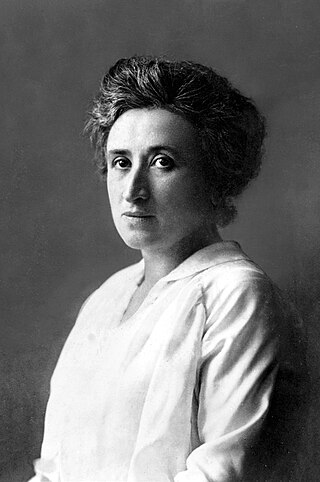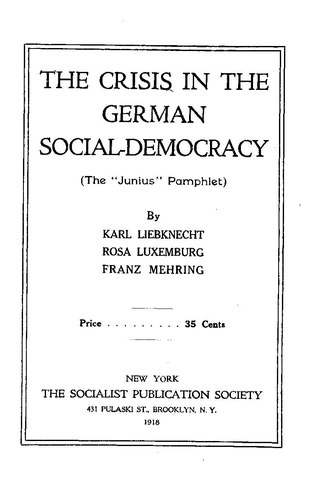Related Research Articles
Left-wing politics describes the range of political ideologies that support and seek to achieve social equality and egalitarianism, often in opposition to social hierarchy as a whole or certain social hierarchies. Left-wing politics typically involve a concern for those in society whom its adherents perceive as disadvantaged relative to others as well as a belief that there are unjustified inequalities that need to be reduced or abolished through radical means that change the nature of the society they are implemented in. According to emeritus professor of economics Barry Clark, supporters of left-wing politics "claim that human development flourishes when individuals engage in cooperative, mutually respectful relations that can thrive only when excessive differences in status, power, and wealth are eliminated."

Rosa Luxemburg was a Polish and naturalised-German revolutionary socialist, orthodox Marxist, and anti-War activist during the First World War. She became a key figure of the revolutionary socialist movements of Poland and Germany during the late 19th and early 20th century, particularly the Spartacist uprising.

Alexandre Millerand was a French politician. He was Prime Minister of France from 20 January to 23 September 1920 and President of France from 23 September 1920 to 11 June 1924. His participation in Waldeck-Rousseau's cabinet at the start of the 20th century, alongside the Marquis de Galliffet, who had directed the repression of the 1871 Paris Commune, sparked a debate in the French Section of the Workers' International (SFIO) and in the Second International about the participation of socialists in bourgeois governments.
Social Reform or Revolution? is an 1899 pamphlet by Polish-German Marxist theorist Rosa Luxemburg. Luxemburg argues that trade unions, reformist political parties and the expansion of social democracy—while important to the proletariat's development of class consciousness—cannot create a socialist society as Eduard Bernstein, among others, argued. Instead, she argues from a historical materialist perspective that capitalism is economically unsustainable and will eventually collapse and that a revolution is necessary to transform capitalism into socialism. The pamphlet was heavily influential in revolutionary socialist circles and along with Luxemburg's other work an important precursor to left communist theory.
Blanquism refers to a conception of revolution generally attributed to Louis Auguste Blanqui (1805–1881) that holds that socialist revolution should be carried out by a relatively small group of highly organised and secretive conspirators. Having seized power, the revolutionaries would then use the power of the state to introduce socialism. It is considered a particular sort of "putschism"—that is, the view that political revolution should take the form of a putsch or coup d'état.
The Federation of the Socialist Workers of France was France's first socialist party, being founded in 1879.

The Moderates or Moderate Republicans, pejoratively labeled Opportunist Republicans, was a French political group active in the late 19th century during the Third French Republic. The leaders of the group included Adolphe Thiers, Jules Ferry, Jules Grévy, Henri Wallon and René Waldeck-Rousseau.

The Accumulation of Capital is the principal book-length work of Rosa Luxemburg, first published in 1913, and the only work Luxemburg published on economics during her lifetime.

The Socialist Republican Union was a political party in France founded in 1935 during the late Third Republic which united the right-wing of the French Section of the Workers' International with the left-wing of the Radical republican movement.

Auguste Marie Joseph Jean Léon Jaurès, commonly referred to as Jean Jaurès, was a French socialist leader. Initially a Moderate Republican, he later became a social democrat and one of the first possibilists and in 1902 the leader of the French Socialist Party, which opposed Jules Guesde's revolutionary Socialist Party of France. The two parties merged in 1905 in the French Section of the Workers' International (SFIO). An antimilitarist, he was assassinated in 1914 at the outbreak of World War I but remains one of the main historical figures of the French Left. As a heterodox Marxist, Jaurès rejected the concept of the dictatorship of the proletariat and tried to conciliate idealism and materialism, individualism and collectivism, democracy and class struggle, and patriotism and internationalism.

Jean Allemane was a French socialist politician, veteran of the Paris Commune of 1871, pioneer of syndicalism, leader of the Socialist-Revolutionary Workers' Party (POSR) and co-founder of the unified French Section of the Workers' International (SFIO) in 1905. He was a deputy in the National Assembly of the Third French Republic.

Jules Bazile, known as Jules Guesde was a French socialist journalist and politician.
Impossibilism is a Marxist theory that stresses the limited value of political, economic, and social reforms under capitalism. As a doctrine, impossibilism views the pursuit of such reforms as counterproductive to the goal of achieving socialism as they stabilize, and therefore strengthen, support for capitalism. Impossibilism holds that reforms to capitalism are irrelevant or outright counter-productive to the goal of achieving socialism and should not be a major focus of socialist politics.
Revolutionary socialism is a political philosophy, doctrine, and tradition within socialism that stresses the idea that a social revolution is necessary to bring about structural changes in society. More specifically, it is the view that revolution is a necessary precondition for transitioning from a capitalist to a socialist mode of production. Revolution is not necessarily defined as a violent insurrection; it is defined as a seizure of political power by mass movements of the working class so that the state is directly controlled or abolished by the working class as opposed to the capitalist class and its interests.
In Marxist philosophy, the dictatorship of the proletariat is a condition in which the proletariat, or working class, holds control over state power. The dictatorship of the proletariat is the transitional phase from a capitalist to a communist economy, whereby the post-revolutionary state seizes the means of production, mandates the implementation of direct elections on behalf of and within the confines of the ruling proletarian state party, and institutes elected delegates into representative workers' councils that nationalise ownership of the means of production from private to collective ownership. During this phase, the organizational structure of the party is to be largely determined by the need for it to govern firmly and wield state power to prevent counterrevolution, and to facilitate the transition to a lasting communist society.

The Spartacus League was a Marxist revolutionary movement organized in Germany during World War I. It was founded in August 1914 as the International Group by Rosa Luxemburg, Karl Liebknecht, Clara Zetkin, and other members of the Social Democratic Party of Germany (SPD) who were dissatisfied with the party's official policies in support of the war. In 1916 it renamed itself the Spartacus Group and in 1917 joined the Independent Social Democratic Party of Germany (USPD), which had split off from the SPD as its left wing faction.
A proletarian revolution or proletariat revolution is a social revolution in which the working class attempts to overthrow the bourgeoisie and change the previous political system. Proletarian revolutions are generally advocated by socialists, communists and anarchists.
Organizational Questions of the Russian Social Democracy, later republished as Leninism or Marxism?, is a 1904 pamphlet by Rosa Luxemburg, a Marxist living in Germany. In the text, she criticized Vladimir Lenin and the Bolshevik faction of the Russian Social Democratic Labour Party (RSDLP) for their position on democratic centralism—the theory behind a vanguard organization of communists having an elected leadership. Luxemburg argued that "spontaneity" of the proletariat is a major factor in socialist revolution. It was first published in Iskra, the RSDLP's newspaper, and Die Neue Zeit, the newspaper of the Social Democratic Party of Germany (SPD).

The Junius Pamphlet was a text written by Rosa Luxemburg in 1915 while she was in prison, against the brutality of the First World War. The actual title of the work was The Crisis of German Social Democracy but she used the pen-name “Junius” to avoid prosecution, and this became the basis of the work's popular name. The name “Junius” was apparently a reference to Lucius Junius Brutus, a hero of the Roman Republic. The pseudonym also echoed a name used to sign political polemics against King George III of England, known as the Letters of Junius.
The National Question and Autonomy is an article by Rosa Luxemburg, one of five originally published in 1908–1909 in Przegląd Socjaldemokratyczny in Kraków. The collection included "The Polish Question at the International Congress in London"; "Foreword to the Anthology The Polish Question and the Socialist Movement"; "The National Question and Autonomy"; "There Can Be No Self-Determination Under Capitalism"; and "The Nationalities Question in the Russian Revolution."
References
- ↑ Macdonald, Dwight. "The Socialist Crisis in France: Introduction". marxists.org. Marxists.org. Retrieved 23 October 2022.
- ↑ "Due Sozialistische Krise in Frankreich". manifest-buecher.de. Manifest Bücher. Retrieved 23 October 2022.
- 1 2 3 Harman, Chris. "Sozialisten in der bürgerlichen Regierung". diefreiheitsliebe.de. Die Freiheitsliebe. Retrieved 23 October 2022.
- ↑ Anderson, Kevin B.; Hudis, Peter (2004). The Rosa Luxemburg Reader. New York: Monthly Review Press. p. 11. ISBN 9781583671030 . Retrieved 23 October 2022.
- ↑ Snyder, Timothy (2018). Nationalism, Marxism, and Modern Central Europe A Biography of Kazimierz Kelles-Krauz, 1872-1905. Oxford: Oxford University Press. pp. 127–8. ISBN 9780190846077 . Retrieved 24 October 2022.
- 1 2 3 Brie, Michael. "Is Socialist Politics Possible from a Position in Government?". rosalux.eu. Rosa-Luxemburg-Stiftung. Retrieved 24 October 2022.
- ↑ O’Kane, Rosemary H. T. (2014). Rosa Luxemburg in Action For Revolution and Democracy. Abingdon: Taylor & Francis. p. 37. ISBN 9781317693376 . Retrieved 24 October 2022.
- ↑ Whalen, R. Cristopher (2011). Inflated: How Money and Debt Built the American Dream. Wiley. p. 93. ISBN 9780470933718 . Retrieved 23 October 2022.
- 1 2 Frohlich, Paul (2020). Rosa Luxemburg - Her Life and Work. Redditch: Read Books Ltd. ISBN 9781528761369 . Retrieved 23 October 2022.
- ↑ Brie, Michael; Schütrumpf, Jörn (2021). Rosa Luxemburg: A Revolutionary Marxist at the Limits of Marxism. Cham, CH: Palgrave Macmillan. pp. 102–3. ISBN 9783030674861 . Retrieved 24 October 2022.